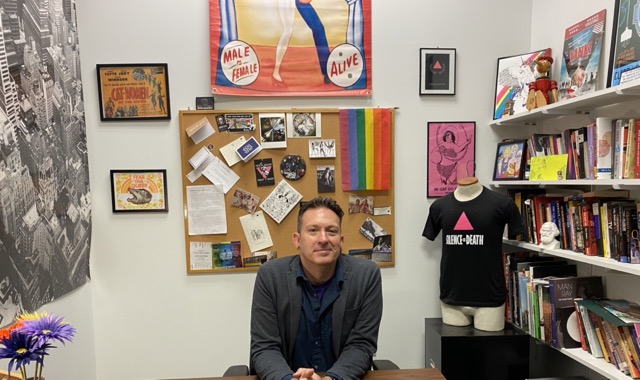The College of William and Mary’s Harrison Ruffin Tyler Department of History has a storied legacy of providing instruction since 1803. In that time, the department has expanded to teach and research topics ranging from the ancient to the contemporary world. The department’s faculty has been celebrated for its excellence in scholarship and teaching. Among those faculty is associate teaching professor of history Jay Watkins III, who has taught at the College since 2018.
At the center of his approach to professorship is discussing engaging topics.
“I made a decision really early on that if I can, I won’t teach anything that I don’t want to take,” Watkins said. “And I try to be very aware that if I’m bored, students are even more bored. And so those two things really kind of frame how I, how I construct classes, how I teach.”
Having grown up in what he likes to refer to as “The Redneck Riviera,” Watkins’ hometown of Panama City, Florida was the start of his long connection to the South, evident from his 2018 book, “Queering the Redneck Riviera: Sexuality and the Ride of Florida Tourism.”
But having that connection does not mean that Watkins’ path to where he is today was straightforward.
“I was going to go to law school and then I got a job at a law firm and decided that’s not the thing I want to do,” Watkins said. “Some folks love it. It was not the thing for me. And so then I was faced with ‘What do I do?’ So I was working at the Gap at the time, and I was going to do marketing, and I did that for all of two weeks before I realized marketing was not the thing I wanted to do. If I’m going to do something for the next 50 years, it’s not going to be convincing people to buy things they don’t need.”
Still unsure of his career path, Watkins turned his attention to first figuring out what major he wanted to pursue during his time as an undergraduate student at Georgia State University.
“I was the kid who was reading history books in middle school and entering the state history contest, all of that. And so I said, well, I’ll take a couple of history classes. Why not?” Watkins said.
One of the most influential courses Watkins took at Georgia State covered the history of sexuality in the United States. The course opened Watkins’ eyes beyond the very narrow instruction he was taught before. Watkins realized that he could expand his vision of history even more.
“I can do really interesting things in history, and you could ask really interesting questions,” Watkins said.
I can do really interesting things in history, and you could ask really interesting questions,” Watkins said.
Eventually, while visiting London for a conference, Watkins had the opportunity to meet one of the founding scholars in his field of research, historian and Emeritus Professor of Arts and Humanities at King’s College John Howard. During this meeting, Watkins mentioned that his tiny hometown had a gay bar that was founded in 1965. Howard pointed out that Watkins should explore why the gay bar existed in a Southern town.
Watkins decided to take this advice, and subsequently pursued a master’s thesis about the topic following his undergraduate degree. Later, he applied for a PhD program at King’s College, London and worked directly with Howard, examining the lives of queer southerners.
After returning to the United States, Watkins spent time teaching at his alma mater, GSU.
“It was great to kind of get my first practice teaching in that environment,” Watkins said.
However, he again began searching for new teaching positions, which is how he ended up at the College. Starting in a visiting professorship position, Watkins worked his way up to the position of lecturer, then senior lecturer.
Currently, Watkins’ research includes examining theater as a means of communicating queer history.
“We don’t learn it in schools. We don’t learn it often in homes. We often don’t learn any of that history, especially up until recently when we didn’t have a lot of media.” Watkins said.
“We don’t learn it in schools. We don’t learn it often in homes. We often don’t learn any of that history, especially up until recently when we didn’t have a lot of media.” Watkins said.
Watkins seeks to shine a light on how lesser known LGBTQ+ theater productions, especially those that exist outside of major cities like New York City and Los Angeles, communicate the story of queer people. In the case of queer Southerners, Watkins hopes to examine the idea of why queer southerners might choose to stay in rural places.
Now, having spent five years at the College, professor Watkins enjoys the freedom professors have to craft courses based around their interests and research.
“I teach a lot of gay stuff,” Watkins said.
His classes include “Southern Queer Theater,” “Sex in America” and more. His courses help introduce students to the rich history of queer individuals in America. Watkins is extremely appreciative of the engaged student body at the College.
“I’ve been so very grateful and very lucky here, in this department in particular, that we have a student body that is interested in all kinds of stuff,” Watkins said. “You know, I get a very wide cross-section of students in these classes. And so part of that is because we have such an engaged student body that comes here.”

